How the Millennium Edition helped Strafe explode (in a good way)
After a rough launch Pixel Titans worked on their roguelike first-person shooter until it became the game it should have been.
Roguelike first-person shooter Strafe had perhaps the only good live-action trailers a game has ever had. One was a "banned commercial" about a kid playing Strafe until his head exploded, the other a cinematic saga involving a gamer who always wins, and graphics that were too realistic. Though perfect evocations of the 1990s, they weren't necessarily great at explaining what kind of game it was.
As a roguelike, Strafe had procedurally generated levels (made from hand-crafted rooms), and permadeath. Some players who'd been drawn in by the spot-on old school shooter graphics were disappointed by that, while others were let down by the guns. As our review by Omri Pettite put it:
...I wished each would scream instead of whimper. The shotgun, dutifully saluting its FPS role as a close-range cleaver, sounded like a popping balloon. I leaned on the railgun’s headshot magic for clearing rooms from a distance, but I could barely hear the zap above the ambient din. I had to leave the assault rifle behind after a few runs—I liked the small touch of its barrel smoke effect, but its bullets and increasing spread felt weak compared to its brothers.
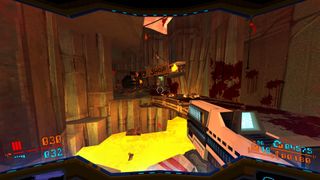
Designers Pixel Titans didn't let the lukewarm reaction dissuade them. They've been tweaking Strafe ever since, and recently added a significant patch called the Millennium Update that presumably brings their slice of 1996 kicking and screaming into the year 2000. Among its changes are daily and weekly challenges. The weekly challenge in particular, the SpeedZone, feels like a return to the '90s design ethos people felt was lacking. It's a map you can replay over and over for a week, learning where the weapon pick-ups and enemies are just like in the old days, but with the modern twist that it's designed for speedrunning, complete with leaderboards.
They've also added save chambers, mutators, and a host of other changes. I asked producer/director Tom Glunt and lead programmer Stephen Raney about some of them.
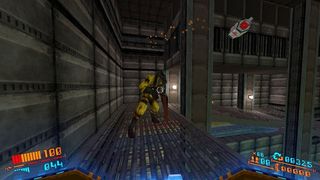
PC Gamer: How did you feel about the reaction to Strafe?
Tom Glunt: It was very bittersweet. We had both ends of the spectrum, a lot of positivity and a lot of negativity. On release there was definitely more bugs and instability than we would have wanted, so that's why we were so quick to patch the game and support it, which is something we'd intended to do regardless. But even outside of that we saw a large confusion—even though we'd said Strafe is a roguelike FPS from its inception, we saw when we put up the first dev post people who would look at stills and assume the game was a Quake clone, then attack the game not on its merits. I don't know how to say it other than that. That kind of sucked, when you get negative feedback that felt as if it wasn't truly applicable to the game.
The biggest gaming news, reviews and hardware deals
Keep up to date with the most important stories and the best deals, as picked by the PC Gamer team.
We could sit there and say, "OK, problem with performance, problems with bugs, we completely get it, we're working on it." If you came for the game for what it was and didn't like it, OK, that's sound. But when you see thinkpieces and very matter-of-fact people saying "this is how the game failed" when it's not our intent to make the game they're describing it feels like "What went wrong here?" We felt like we were clear as possible but it wasn't getting through to everybody.
It's just the nature of the beast when you're making a game that took influences from old school shooters as well as influences from roguelikes. I loved the feel of Quake and games like that with offensive and defensive movement—you're using offense as defense, all the enemy projectiles are projectile-based not hitscan-based, so you had things to dodge. Each enemy had a unique behavior so you could learn about them.
But going back and playing Quake again, and a lot of these older shooters, I still remember them. I still remember the layouts, the secrets, and after playing a bunch of Spelunky at the time in 2014 I was like, "How great would it be if I could jump into this fresh for the first time, always have a new experience, not really know what's coming around?" That's what we aimed to create.
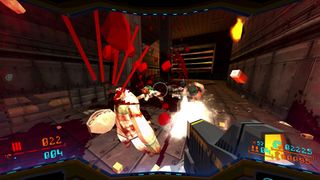
Tell me about some of the unlockable modifiers you've added. There's Instagib, there's Traditional Mode, but what is "Call Me Lil Joby"?
[Both laugh]
TG: There's a character in the game, his name's Lil Joby. He's not an enemy, he's an NPC that wanders around, a little reptilian toddler that was visible at the end of our gameplay trailer at launch, and if you turn that modifier or mutator on you'll play as Lil Joby. You'll be like a foot high off the ground and you'll have green arms and all your audio, instead of sounding like either StrafeMan or Woman you now sound like Lil Joby.
What are some of the other game modes that are a bit unusual?
TG: Instagib, Rocket Arena, GunGame, a lot of those are callbacks to the kind of game modes that you would play in the early 2000s or in the late '90s where you're able to modify the game for a new challenge.
But then we have cosmetic ones that are just fun to do like Big Head Mode, Call Me Lil Joby—which does make you smaller, does change the gameplay a little bit but for the most part it's just a new perspective—and Lil Chumps making the enemies tiny.
Then we have ones that drastically change the gameplay in inventive ways. We designed each enemy to fit its zone, to fit almost like chess where you design a pawn then say what else could we use? OK, let's put a rook in there, OK what else can we use? We tried to come up with these different enemies that fit well when you have like, I forget what we called it, the Cache and the Enemies?
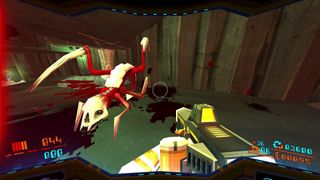
Stephen Raney: Scrambled Enemies?
TG: Scrambled Enemies and Scrambled Cache. What happens there is there's no limit to what gun you can find and there's no limits on what enemies can spawn in the level, so you can run into enemies from our last zone, Athena, in [first zone] Icarus. It's just been a fun way to switch up the game and play with that.
I think Steve did add some behavioral things where you can get themes throughout the levels so it's not completely random. If it chooses a random enemy it says, "OK, you get the soldier from the last zone, well, we're gonna use him as a theme throughout this level." You'll see more of them so you don't just see just a mess of scrambled enemies and it doesn't make sense. There's still some kind of theme there.
Then there's some where we just play with the format of the game such as Strafe Abridged. It's four levels long but you take four times as much damage... Then there's Get Rich or Die Tryin' where the enemies are harder but you get more scrap while you play. There's Traditional Mode where it locks a seed for you to play but you get three lives and when you die you don't go back to the beginning of the game, you go back to the beginning of the level that you died in. Any ones I'm missing, Steve?
SR: Nothing super great. We have little silly ones like Hyperdrive.
TG: I think Hyperdrive is really fun but really dumb.
SR: Yeah. Hyperdrive's like as if you are in a ship that was going Hyperdrive so all gravity flies to the sides. You play normally but as soon as you kill somebody or you shoot a projectile that'd be affected by physics it's all skewed by this weird gravity.

"Gunfeel" is obviously important in a first-person shooter, and I know you guys made some tweaks to the way guns work. Can you talk me through that stuff?
SR: In terms of total changes we've done since launch, we did change some of the audio cause the initial thought was that we'd have the music drive things but people seemed to think that the guns were then flat. We boosted up the gun sounds which I think helped the feel a lot. We changed how tight the machine gun fires. We want all the guns to be really good when you start, not amazing but...
TG: Effective.
SR: You feel powerful throughout it. You also upgrade your guns as you play through so they're getting more powerful as the enemies are also getting more powerful, but the machine gun seemed like maybe it was a little bit unfriendly at first. We tightened up the spread on that, which makes it a little bit more of a headshot cannon which is always fun. We have alternate primary and secondary fires and we did a big balance change to various buffs and debuffs of different ones.
What's the reaction been like so far to the changes you've made?
TG: It's been very positive. From launch there's been a few things that hit us hard. A mix of expectations for the game, a mix of the performance on launch, and a mix of people not reading that it was a roguelike and then the consistency of receiving negative feedback or negative reviews because they wanted just a Quake clone.
We worked hard for the update, not only updating the game but reinforcing the messaging and making sure that it is really hard to miss that the game's a roguelike, instead of just explaining what the elements of a roguelike are. We've always had roguelike written next to in the "about this game" and up in the blurb on Steam, but people were still missing it. So I put it in the trailers, the first shot. We added a section that said "What this game isn't" so we can address those assumptions that people may have, and made sure that we filled the game with as much new content as we could get in that we thought was great. Overall it's raised the general user review score of the game, and we've been getting a lot of good feedback.
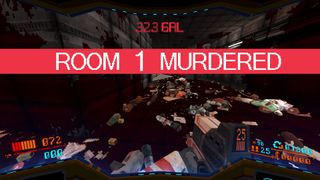

Jody's first computer was a Commodore 64, so he remembers having to use a code wheel to play Pool of Radiance. A former music journalist who interviewed everyone from Giorgio Moroder to Trent Reznor, Jody also co-hosted Australia's first radio show about videogames, Zed Games. He's written for Rock Paper Shotgun, The Big Issue, GamesRadar, Zam, Glixel, Five Out of Ten Magazine, and Playboy.com, whose cheques with the bunny logo made for fun conversations at the bank. Jody's first article for PC Gamer was about the audio of Alien Isolation, published in 2015, and since then he's written about why Silent Hill belongs on PC, why Recettear: An Item Shop's Tale is the best fantasy shopkeeper tycoon game, and how weird Lost Ark can get. Jody edited PC Gamer Indie from 2017 to 2018, and he eventually lived up to his promise to play every Warhammer videogame.
Most Popular




